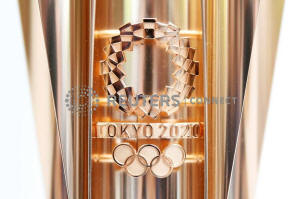Tokyo 2020 to power Olympic torch
with hydrogen for first time
 Send a link to a friend
Send a link to a friend
 [January 27, 2020]
TOKYO (Reuters) - Hydrogen will
be used for the first time to power the Olympic torch during its
journey through Japan, organizers said on Monday, as part of Tokyo
2020's efforts to hold an environmentally friendly Games. [January 27, 2020]
TOKYO (Reuters) - Hydrogen will
be used for the first time to power the Olympic torch during its
journey through Japan, organizers said on Monday, as part of Tokyo
2020's efforts to hold an environmentally friendly Games.
Organizers aim to offset all carbon emissions generated during the
Games and also use the Olympics to boost awareness of environmental
issues in Japan.
The Tokyo 2020 Organising Committee said certain stages of the torch
relay will use hydrogen, which emits no carbon dioxide when it is
burned, and it will also fuel the ceremonial Olympic Cauldron
featuring in the Games' opening and closing ceremonies.

Hydrogen will be used to power the torch on its journey through the
prefectures of Fukushima and Aichi, as well as parts of Tokyo, with
gas used in other stages of the relay.
"During its preparations for the Games, Tokyo 2020 has consistently
promoted energy conservation and the use of renewable energy with
the aim of supporting the realization of a carbon-neutral society,"
the organizers said in a statement.
About 500 hydrogen-powered fuel cell vehicles will also be used
during the Olympics, which run from July 24 to Aug. 9.
[to top of second column] |

The Olympic torch
of the Tokyo 2020 Olympic Games
is displayed at a Torch Relay event to mark the 300-day milestone to
the starting date of the torch relay, in Tokyo, Japan June 1, 2019.
REUTERS/Issei Kato

Other initiatives to cut the environmental impact of the Games
include beds made from recyclable cardboard in the athletes'
village, Olympic medals made from recycled consumer electronics and
the torches themselves, formed of aluminum waste.
The torch relay begins in Fukushima on March 26 and will visit all
47 of Japan's prefectures ahead of the July 24 opening ceremony.
(Reporting by Jack Tarrant; Editing by Clarence Fernandez)
[© 2020 Thomson Reuters. All rights
reserved.] Copyright 2020 Reuters. All rights reserved. This material may not be published,
broadcast, rewritten or redistributed.
Thompson Reuters is solely responsible for this content.
 |